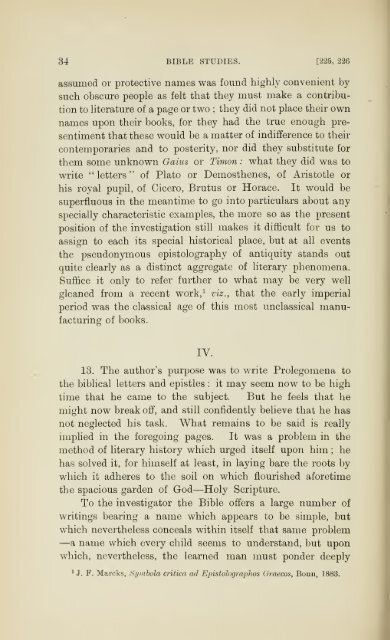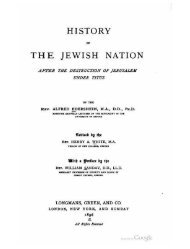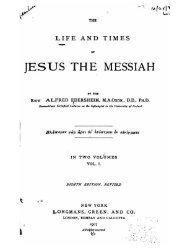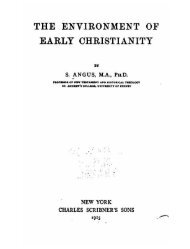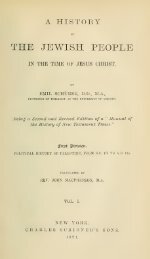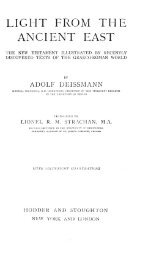- Page 1 and 2: v >^ ^^'a*^' BIBLE STUDIES CONTRIBU
- Page 3 and 4: Pbeface to the English Edition CONT
- Page 5 and 6: AUTHOK'S PREFACE TO THE ENGLISH EDI
- Page 7 and 8: FROM THE PREFACE TO THE GERMAN EDIT
- Page 9: FROM THE PREFACE TO THE GERMAN EDIT
- Page 12 and 13: XIV TEANSLATOE S NOTE. expressing h
- Page 15 and 16: PKOLEGOMENA TO THE BIBLICAL LETTEES
- Page 17 and 18: PEOLEGOMENA TO THE BIBLICAL LETTERS
- Page 19 and 20: 191, 192] LETTERS AND EPISTLES. 5 h
- Page 21 and 22: 193, 194] LETTEES AND EPISTLES. 7 m
- Page 23 and 24: 195, 196] LETTEES AND EPISTLES. 9 r
- Page 25 and 26: 197, 198] LETTERS AND EPISTLES. 11
- Page 27 and 28: 199, 200] LETTEES AND EPISTLES. 13
- Page 29 and 30: 201, 202] LETTERS AND EPISTLES. 15
- Page 31 and 32: 203, 204] LETTEES AND EPISTLES. 17
- Page 33 and 34: 205, 206] LETTERS AND EPISTLES. 19
- Page 35 and 36: 207, 208] LETTEKS AND EPISTLES. 21
- Page 37 and 38: LETTEES AND EPISTLES. 23 II. Letter
- Page 39 and 40: 216, 217] LETTEES AND EPISTLES. 25
- Page 41 and 42: 218, 219] LETTERS AND EPISTLES. 27
- Page 43 and 44: 220, 221] LETTERS AND EPISTLES. 29
- Page 45 and 46: 222, 223] LETTEES AND EPISTLES. 31
- Page 47: 224, 225] LETTERS AND EPISTLES. 33
- Page 51 and 52: 229] LETTERS AND EPISTLES. 37 The l
- Page 53 and 54: 231] LETTERS AND EPISTLES. 39 alrea
- Page 55 and 56: 233] LETTERS AND EPISTLES. 41 has b
- Page 57 and 58: 235] LETTERS AND EPISTLES. 43 metho
- Page 59 and 60: 237, 238] LETTERS AND EPISTLES. 45
- Page 61 and 62: 239, 240] LETTERS AND EPISTLES. 47
- Page 63 and 64: 241, 242] LETTEES AND EPISTLES. 49
- Page 65 and 66: 243, 244] LETTEES AND EPISTLES. 51
- Page 67 and 68: 246] LETTEES AND EPISTLES. 53 Imita
- Page 69 and 70: 247, 248] LETTERS AND EPISTLES. 55
- Page 71 and 72: 249, 250] LETTEES AND EPISTLES. 57
- Page 73: 251, 252] LETTERS AND EPISTLES. 59
- Page 76 and 77: avolyui TO. fivrffxara v/xitiv koI
- Page 78 and 79: 64 BIBLE STUDIES. [58 language". Th
- Page 80 and 81: 66 BIBLE STUDIES. [60 and pays no h
- Page 82 and 83: 68 BIBLE STUDIES. [62 the syntax wa
- Page 84 and 85: 70 BIBLE STUDIES. [64, 65 borrowed
- Page 86 and 87: 72 BIBLE STUDIES. [66, 67 lization
- Page 88 and 89: 74 BIBLE STUDIES. [68, 69 Greek wor
- Page 90 and 91: 76 BIBLE STUDIES. [71 illusion^ tha
- Page 92 and 93: 78 BIBLE STUDIES. [73 over them '?
- Page 94 and 95: 80 BIBLE STUDIES. [74, 75 When, the
- Page 96 and 97: 82 BIBLE STUDIES. [76, 77 they rend
- Page 98 and 99:
84 BIBLE STUDIES. [78 who was descr
- Page 100 and 101:
af^yapevo). Herodotus and Xenophon
- Page 102 and 103:
88 BIBLE STUDIES. [83 similar use,
- Page 104 and 105:
90 BIBLE STUDIES. [85 it is rather
- Page 106 and 107:
92 BIBLE STUDIES. [87, 88 Frequent,
- Page 108 and 109:
94 BIBLE STUDIES. [Si», 90 to a me
- Page 110 and 111:
96 BIBLE STUDIES. [91, 92 Is. 43^^
- Page 112 and 113:
98 BIBLE STUDIES. [93, 94 dp-)(^t,(
- Page 114 and 115:
100 BIBLE STUDIES. [95, 96 itself m
- Page 116 and 117:
102 BIBLE STUDIES. [97, 98 jSacTTdt
- Page 118 and 119:
104 BIBLE STUDIES. [100 part ; the
- Page 120 and 121:
106 BIBLE STUDIES. [102 striking si
- Page 122 and 123:
108 BIBLE STUDIES. [104 a hundred a
- Page 124 and 125:
110 BIBLE STUDIES. [106, 107 it is
- Page 126 and 127:
112 BIBLE STUDIES. [108, 109 choice
- Page 128 and 129:
114 BIBLE STUDIES. [110, 111 neighb
- Page 130 and 131:
116 BIBLE STUDIES. [112, US lies at
- Page 132 and 133:
118 SbIBLE studies. [114, 115 et? a
- Page 134 and 135:
120 BIBLE STUDIES. [116, 117 heart.
- Page 136 and 137:
122 BIBLE STUDIES. [118, 119 meanin
- Page 138 and 139:
124 BIBLE STUDIES. [121 and in the
- Page 140 and 141:
126 IBIBLE STUDIES.! [123 17 ^^ (if
- Page 142 and 143:
128 BIBLE STUDIES. [125 is not corr
- Page 144 and 145:
130 BIBLE STUDIES. [126, 127 sacrif
- Page 146 and 147:
182 BIBLE STUDIES. [129 author cons
- Page 148 and 149:
134 BIBLE STUDIES. [131, 132 tion,
- Page 150 and 151:
136 BIBLE STUDIES. [133, 134 'yap ^
- Page 152 and 153:
138 BIBLE STUDIES. [135, 136 The ce
- Page 154 and 155:
140 BIBLE STUDIES. [137, 138 butive
- Page 156 and 157:
142 BIBLE STUDIES. [139, 140 which
- Page 158 and 159:
144 BIBLE STUDIES. [141, 142 Paul h
- Page 160 and 161:
146 BIBLE STUDIES. [143, 144 ovoixa
- Page 162 and 163:
148 BIBLE STUDIES. [145, 146 our gu
- Page 164 and 165:
150 BIBLE STUDIES, [148,149 41 ^ an
- Page 166 and 167:
152 BIBLE STUDIES. [150, 151 with t
- Page 168 and 169:
154 BIBLE STUDIES. [152, 153 period
- Page 170 and 171:
156 BIBLE STUDIES. [154, 155 who ha
- Page 172 and 173:
158 BIBLE STUDIES. [156, 157 anoixe
- Page 174 and 175:
160 BIBLE STUDIES. [158, 159
- Page 176 and 177:
162 BIBLE STUDIES. [161, 162 which
- Page 178 and 179:
164 BIBLE STUDIES. . [164 antithese
- Page 180 and 181:
166 BIBLE STUDIES. [166, 167 vlof '
- Page 182 and 183:
168 BIBLE STUDIES. [160, 161 were,
- Page 185 and 186:
III. FUKTHER CONTRIBUTIONS TO THE H
- Page 187 and 188:
I — FUETHEE CONTEIBUTIONS TO THE
- Page 189 and 190:
N. 3] LANGUAGE OF THE GREEK BIBLE.
- Page 191 and 192:
N. 5] LANGUAGE OP THE GREEK BIBLE.
- Page 193 and 194:
N. 7] LANGUAGE OF THE GEEEK BIBLE.
- Page 195 and 196:
NOTES ON THE ORTHOGRAPHY. The ortho
- Page 197 and 198:
N.10,11] LANGUAGE OF THE GREEK BIBL
- Page 199 and 200:
N. 13] LANGUAGE OF THE GREEK BIBLE.
- Page 201 and 202:
N. 15] LANGUAGE OF THE GREEK BIBLE.
- Page 203 and 204:
N. 17] LANGUAGE OF THE GREEK BIBLE.
- Page 205 and 206:
N.18,19] LANGUAGE OF THE GREEK BIBL
- Page 207 and 208:
N. 20, 21] LANGUAGE OF THE GEEEK BI
- Page 209 and 210:
N. 23] LANGUAGE OF THE GREEK BIBLE.
- Page 211 and 212:
— N. 25] LANGUAGE OF THE GREEK BI
- Page 213 and 214:
N. 27] LANGUAGE OF THE GEEEK BIBLE.
- Page 215 and 216:
N. 29] LANGUAGE OF THE GREEK BIBLE.
- Page 217 and 218:
N. 31] LANGUAGE OF THE GREEK BIBLE.
- Page 219 and 220:
N. 33] LANGUAGE OF THE GREEK BIBLE.
- Page 221 and 222:
N. 35] LANGUAGE OF THE GREEK BIBLE.
- Page 223 and 224:
N. 37] LANGUAGE OF THE GREEK BIBLE.
- Page 225 and 226:
N. 39] LANGUAGE OF THE GREEK BIBLE.
- Page 227 and 228:
N.40,41] LANGUAGE OF THE GREEK BIBL
- Page 229 and 230:
N.42,43] LANGUAGE OF THE GREEK BIBL
- Page 231 and 232:
N.44,45] LANGUAGE OF THE GREEK BIBL
- Page 233 and 234:
N.46,47] LANGUAGE OF THE GEEEK BIBL
- Page 235 and 236:
N. 48,49] LANGUAGE OF THE GREEK BIB
- Page 237 and 238:
N.50,51] LANGUAGE OF THE GEEEK BIBL
- Page 239 and 240:
N. 52] LANGUAGE OF THE GREEK BIBLE.
- Page 241 and 242:
N. 54] LANGUAGE OF THE GREEK BIBLE.
- Page 243 and 244:
N. 56] LANGUAGE OF THE GEEEK BIBLE.
- Page 245 and 246:
N. 57, 58] LANGUAGE OF THE GREEK BI
- Page 247 and 248:
N. 60] LANGUAGE OF THE GREEK BIBLE.
- Page 249 and 250:
N. 62, 63] LANGUAGE OF THE GEEEK BI
- Page 251 and 252:
N. 64, 65] LANGUAGE OF THE GEEEK BI
- Page 253 and 254:
N. 66, 67] LANGUAGE OF THE GREEK BI
- Page 255 and 256:
N. 69] LANGUAGE OF THE GREEK BIBLE.
- Page 257 and 258:
N. 71, 72] LANGUAGE OF THE GKEEK BI
- Page 259 and 260:
N. 73] LANGUAGE OF THE GEEEK BIBLE.
- Page 261 and 262:
N. 75, 67] LANGUAGE OF THE GREEK BI
- Page 263 and 264:
N. 76, 77] LANGUAGE OF THE GEEEK BI
- Page 265 and 266:
N. 79] LANGUAGE OF THE GREEK BIBLE.
- Page 267 and 268:
N. 81] LANGUAGE OF THE GREEK BIBLE.
- Page 269 and 270:
N. 82, 83] LANGUAGE OF THE GREEK BI
- Page 271 and 272:
N.84,85] LANGUAGE OF THE GEEEK BIBL
- Page 273 and 274:
N. 86, 87] LANGUAGE OF THE GREEK BI
- Page 275 and 276:
N.88,89] LANGUAGE OF THE GREEK BIBL
- Page 277 and 278:
N.90,91] LANGUAGE OF THE GBEEK BIBL
- Page 279 and 280:
N.92,93] LANGUAGE OF THE GREEK BIBL
- Page 281:
N.94,96] LANGUAGE OF THE GREEK BIBL
- Page 284 and 285:
€1 apaye if/rjXa(f>T^(r€iav avT
- Page 286 and 287:
272 BIBLE STUDIES. [24 necessarily
- Page 288 and 289:
274 BIBLE STUDIES. [26, 28 June of
- Page 290 and 291:
276 BIBLE STUDIES. [29, 30 Ovp^ava,
- Page 292 and 293:
278 BIBLE STUDIES. [32 thee by him
- Page 294 and 295:
280 BIBLE STUDIES. [34 person loved
- Page 296 and 297:
— — 282 BIBLE STUDIES. [36, 37
- Page 298 and 299:
284 BIBLE STUDIES. [38, 39 similarl
- Page 300 and 301:
286 BIBLE STUDIES. [40, 41 (third c
- Page 302 and 303:
288 BIBLE STUDIES. [42, 43 wrote be
- Page 304 and 305:
290 BIBLE STUDIES. [44, 45 eOero av
- Page 306 and 307:
292 BIBLE STUDIES. [46, 4T word doe
- Page 308 and 309:
294 BIBLE STUDIES. [48, 49 tablet,
- Page 310 and 311:
296 BIBLE STUDIES. [50, 51 well,^ t
- Page 312 and 313:
298 BIBLE STUDIES. [52, 53 tion 'of
- Page 314 and 315:
300 BIBLE STUDIES. [54 best in the
- Page 316 and 317:
Tov ^Xioy ainov dvareXXei iirl Trov
- Page 318 and 319:
304 BIBLE STUDIES. [172 priest save
- Page 320 and 321:
806 BIBLE STUDIES. [174 for his kin
- Page 322 and 323:
308 BIBLE STUDIES. [176 /cXr;cre&)9
- Page 324 and 325:
310 BIBLE STUDIES. [178 and Nehuzar
- Page 326 and 327:
312 BIBLE STUDIES. [180, 181 his co
- Page 328 and 329:
•gl4 BIBLE STUDIES. [182, 183 Ant
- Page 330 and 331:
316 BIBLE STUDIES. [184, 185 the ca
- Page 333 and 334:
1 VI. GKEEK TRANSCKIPTIONS OF THE T
- Page 335 and 336:
GEEEK TRANSCEIPTIONS OF THE TETRA-
- Page 337 and 338:
5,6] THE TETRAGRAMMATON. 323 Museum
- Page 339 and 340:
7, 8] THE TETRAGRAMMATON. 325 961 a
- Page 341 and 342:
9, 10] THE TETRAGRAMMATON. 327 F. D
- Page 343 and 344:
11, 12] THE TETRAGRAMMATON. 329 bil
- Page 345 and 346:
13, 14] THE TETRAGRAMMATON. 331 lao
- Page 347 and 348:
15, 16] THE TETRAGRAMMATON. 333 app
- Page 349 and 350:
18] THE TETRAGRAMMATON. 335 however
- Page 351 and 352:
VII. SPICILEGIUM. 22
- Page 353 and 354:
1. THE CHEONOLOGICAL STATEMENT IN T
- Page 355 and 356:
257, 258] EDICT AGAINST EGYPTIAN JE
- Page 357 and 358:
259] EDICT AGAINST EGYPTIAN JEWS. 3
- Page 359 and 360:
. which 261] EDICT AGAINST EGYPTIAN
- Page 361 and 362:
263] "LARGE LETTERS" AND "MARKS OF
- Page 363 and 364:
265] "THE MABKS OF JESUS." 349" way
- Page 365 and 366:
267] "THE MARKS OF JESUS." 351 a fe
- Page 367 and 368:
269] " THE MARKS OF JESUS." 363 Lee
- Page 369 and 370:
271] "the MAEKS of JESUS." 355 few
- Page 371 and 372:
273] "THE MARKS OP JESUS." 357 L. 6
- Page 373 and 374:
275] "the MAEKS OF JESUS." 359 the
- Page 375 and 376:
277, 278] A NOTE TO SECOND PETER. 3
- Page 377 and 378:
279, 280] A NOTE TO SECOND PETEE. 3
- Page 379 and 380:
281, 282] A NOTE TO SECOND PETER. 3
- Page 381 and 382:
283, 284] A NOTE TO SECOND PETEE. 3
- Page 383 and 384:
285, 286] WHITE ROBES AND PALMS. 8(
- Page 385 and 386:
. I. INDEX OF GEEEK WOEDS AND PHEAS
- Page 387 and 388:
tJ) OeaeKiov, 123. ee6s,'l67, 223.
- Page 389 and 390:
vlhs viro^vyiov, 162. viol [?] (pap
- Page 391 and 392:
Jews (corUiniied)— Dissemination
- Page 393 and 394:
Tetragrammaton, 319 If. Thayer, J.
- Page 395 and 396:
Daniel. 110 123 3'« 363 6^ 92 Q^ 2
- Page 397 and 398:
61 233 618 202 72 124 7'-> 192 75 7
- Page 399 and 400:
— — — — — — — — PUB
- Page 401 and 402:
— — — — — — — — T.
- Page 403 and 404:
— — — — — — T. and T. C
- Page 405 and 406:
— — — — — — — — T.
- Page 407 and 408:
— — — — T. and T. Clarks Pu
- Page 409 and 410:
— — — — — — — — —
- Page 411 and 412:
— T. and T, Clark's Publications.
- Page 413 and 414:
T. and T. Clark's Publications. THE
- Page 417:
IQ O CO DNIYfiRSlTY OF TORONTO LIBR


